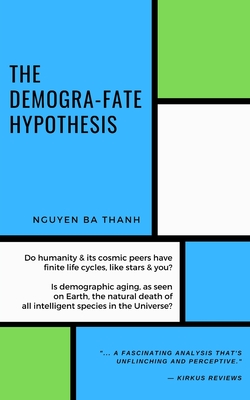The demogra-fate hypothesis

The demogra-fate hypothesis
"Nguyen Ba Thanh wonders if death by old age is civilisation's destiny." - Philosophy Now"... a fascinating analysis that's unflinching and perceptive." - Kirkus ReviewsIf all else-your body and memories, stars, the universe itself-has a birth-death life cycle, can species like ours exist forever? As they modernize, birthrates in 100+ countries have fallen below the replacement minimum of 2.1 births/woman. Sustained sub-2.1 fertility will make societies older and smaller. With India, South Africa, Mexico... crossing below the 2.1 threshold, will the entire species follow fast-aging and shrinking Japan, whose median age may top 60 well before 2100?Enter our demogra-fate hypothesis: does demographic aging conclude the natural life cycle of all intelligent species in the universe?Given no say in their date/place of birth, technological civilizations are just randomly evolved wildflowers of the great cosmic desert. While sentient life may have arisen separately in lonely oases far across the cosmos, are aliens and humans that different in nature or destiny? Due to the unfathomable vastness of space, there should be quite a few of us. Even if only 01 civilization existed for every 10 galaxies, there would still be around 20 billion civilizations concurrently alive within our 200-billion-galaxy universe. Can 0.3-million-year-old humankind survive until the death of this Big Bang-started universe in tens of billions of years, in a Big Crunch/Chill/Rip scenario? Or do intelligent species-brainier but always part of wild nature-just blindly and purposelessly bloom and die, here one million years and gone the next? With no real say in their own death, like true desert wildflowers?How, actually, can cosmic civilizations grow old and die naturally? Is population aging on Earth the final stage of a natural life cycle for intelligent species? Does an inevitable fate of demographic aging and death banally await all civilizations that survive accidents or ecological suicide in their younger years? Although galaxies apart, are those enlightened species all helpless against nature's birth-death law? Despite being keenly aware of that law, something no lower species is capable of? Much like individual humans are only too aware of yet helpless against their bodies' unstoppable aging and dying?In deciphering intelligent life's (wild?) nature and (fleeting?) destiny in the universe, the demogra-fate hypothesis is empirically based. Population aging has been widely spotted a
PRP: 53.32 Lei
Acesta este Prețul Recomandat de Producător. Prețul de vânzare al produsului este afișat mai jos.
47.99Lei
47.99Lei
53.32 LeiLivrare in 2-4 saptamani
Descrierea produsului
"Nguyen Ba Thanh wonders if death by old age is civilisation's destiny." - Philosophy Now"... a fascinating analysis that's unflinching and perceptive." - Kirkus ReviewsIf all else-your body and memories, stars, the universe itself-has a birth-death life cycle, can species like ours exist forever? As they modernize, birthrates in 100+ countries have fallen below the replacement minimum of 2.1 births/woman. Sustained sub-2.1 fertility will make societies older and smaller. With India, South Africa, Mexico... crossing below the 2.1 threshold, will the entire species follow fast-aging and shrinking Japan, whose median age may top 60 well before 2100?Enter our demogra-fate hypothesis: does demographic aging conclude the natural life cycle of all intelligent species in the universe?Given no say in their date/place of birth, technological civilizations are just randomly evolved wildflowers of the great cosmic desert. While sentient life may have arisen separately in lonely oases far across the cosmos, are aliens and humans that different in nature or destiny? Due to the unfathomable vastness of space, there should be quite a few of us. Even if only 01 civilization existed for every 10 galaxies, there would still be around 20 billion civilizations concurrently alive within our 200-billion-galaxy universe. Can 0.3-million-year-old humankind survive until the death of this Big Bang-started universe in tens of billions of years, in a Big Crunch/Chill/Rip scenario? Or do intelligent species-brainier but always part of wild nature-just blindly and purposelessly bloom and die, here one million years and gone the next? With no real say in their own death, like true desert wildflowers?How, actually, can cosmic civilizations grow old and die naturally? Is population aging on Earth the final stage of a natural life cycle for intelligent species? Does an inevitable fate of demographic aging and death banally await all civilizations that survive accidents or ecological suicide in their younger years? Although galaxies apart, are those enlightened species all helpless against nature's birth-death law? Despite being keenly aware of that law, something no lower species is capable of? Much like individual humans are only too aware of yet helpless against their bodies' unstoppable aging and dying?In deciphering intelligent life's (wild?) nature and (fleeting?) destiny in the universe, the demogra-fate hypothesis is empirically based. Population aging has been widely spotted a
Detaliile produsului










